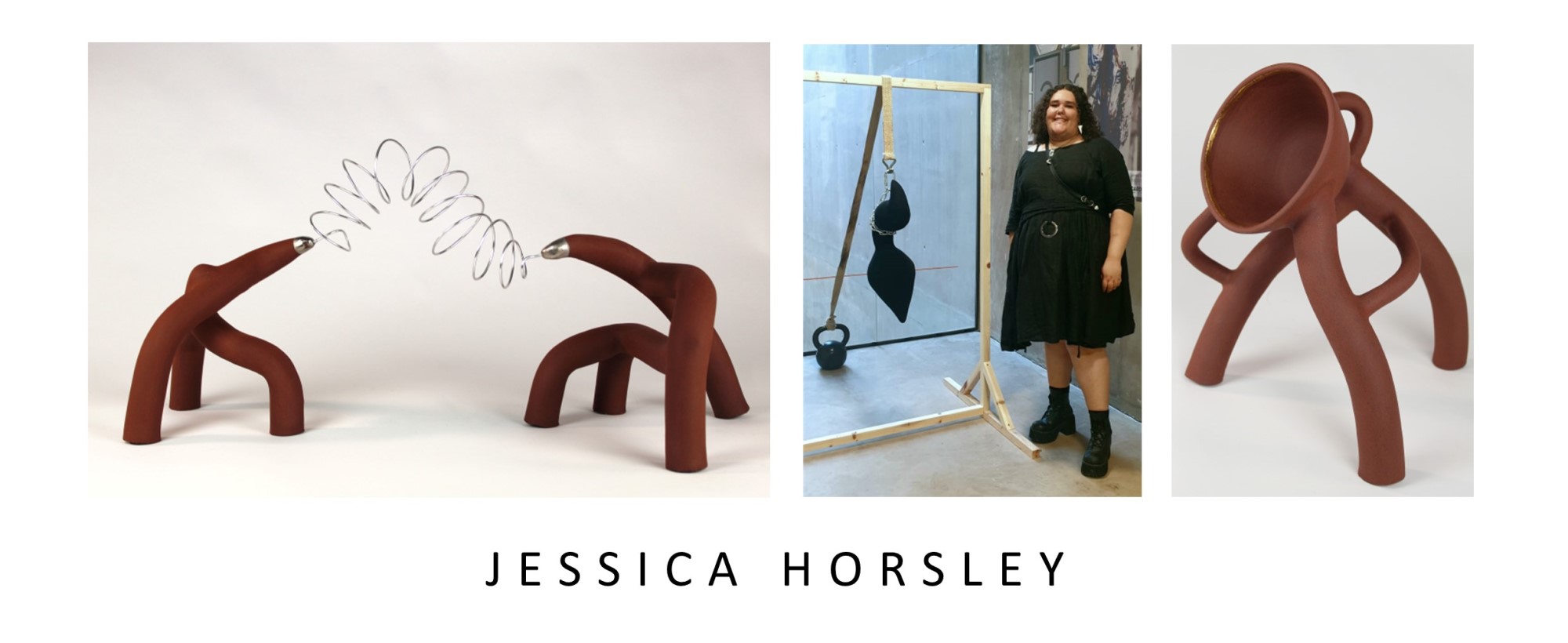2024 AWARD WINNER | Cardiff School of Art & Design
Posted on - 15th August 2024

JESSICA HORSLEY | Cardiff School of Art & Design | BA (Hons) Ceramic Design
Recipient of the Potclays Graduate Award in 2024 as part of our Educlaytion programme
Please tell us about yourself, your work, and your career path so far.
I’ve been using clay as my primary medium for 13 years now, beginning with an evening class at
my college. This prompted me to switch from studying A Levels to a BTEC in Fine Art to spend
more time using clay. I started ceramics primarily as a functional maker and did a traineeship in
production throwing after graduating college, so for a lot of my time with clay I have been
working in the mode of a functional maker, rather than an artist.
I decided to come to university after using my savings to build a studio behind my parent’s
garage, it’s made of breeze blocks and leaks no matter what I do, but it’s mine! Conveniently (or
not) that finished just as the pandemic began, which killed any inspiration I’d had for making. I
thought I needed a radical change and got into Cardiff Metropolitan University through clearing
that summer. Most of my best decisions happen in quick succession, and this proved to be one
of them. Studying ceramics transformed my making for the better.
Describe your first encounter with clay?
My first encounter with clay must be like everybody’s, finding it in the ground. There was a lot of
clay in the garden I grew up in, and I’ve always had an affinity for worms, so in my quest for them
I’d say my first encounter was almost certainly straight from the ground. My first formal
encounter was probably at the Denby Pottery after winning a prize at around 6 or 7 for designing
the best Halloween plate.
Why did you choose ceramics?
There’s a certain feeling and rhythm to ceramics that suits me, it feels ancient and infinite in the
way that you can change the materials to suit you, recycle them, shape and re-shape. It’s like a
language, when I have something to express creatively it’s the first thing I turn to.
Where do you find inspiration? Places, people, objects, music…
I find a lot of my inspiration through conceptual research; I would consider myself research led
in that way. My latest work has been inspired by religion, politics, history, ecology, sound, and
societal structures. I almost always listen to music when I’m working too, and sometimes that
can influence the outcome of what I’m making. Some genres are better for working faster, some
are better for delicate work, and elevator music is always perfect for academic reading, who
knows why.
What are the tools of your trade that you can’t do without?
I’m very fond of metal ribs and kidneys, smooth and serrated. I also think that finishing sponges
are indispensable, along with my xiem retractable scoring tool which I will without fail stab
myself with every time I wash it. I have miscellaneous cards I’ve had for years that I’ve made
into ribs, like an old national express discount card, the most recent addition to the card
collection is a broken student ID.
What is a typical day in the studio like?
My days are varied depending on what I need to do. I keep big to-do lists leading up to finishing a
project or body of work, so the morning is organising what needs to be done first, be that
making, firing, glazing, lustring, writing, or programming. If I’m making, I’ll prepare my coils or
extrusions first, either enough for the whole day or half a day. I work until I’ve used them all or
until I get hungry. I always try to find somewhere quiet to eat lunch to cool my brain down, I tend
not to socialise much when I’m working during the day, but I get chattier in the evening after
hours since our studio was often open at night.
What do the next 12 months have in store for you?
Hopefully for the next 12 months I’ll be able to stay in the Cardiff ceramics community and find
a studio to continue my work. I have been doing research and playing with some ideas I’m really
excited about. I’m looking forward to exploring modulators soon and more physical computing
things I can combine with ceramic artefacts.
What advice do you have for those currently studying ceramics in further education?
Ceramics is hard to access and sustain, university can be a way to explore it to its fullest. I think
for that alone going on to study ceramics in higher education has been worth it for me. There are
alternatives depending on what you’re interested in and where you are, like apprenticeships,
traineeships, and similar; those opportunities are great, and you should take them if you can
find them. Also, don’t underestimate the academic component of continuing studies in any art,
if you love to be challenged that way then university is for you!

